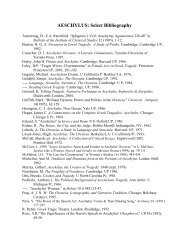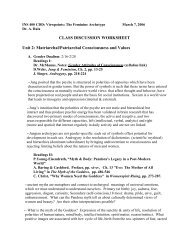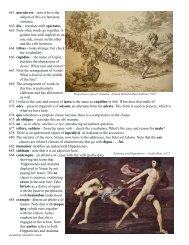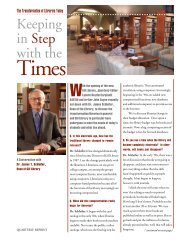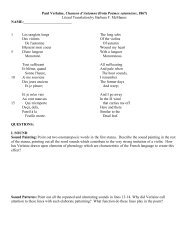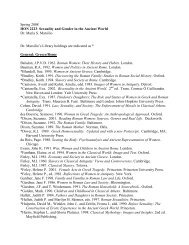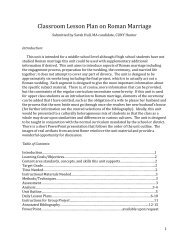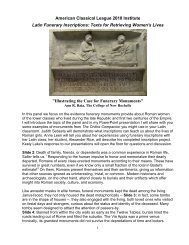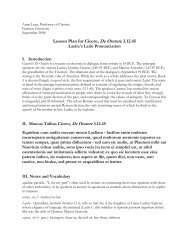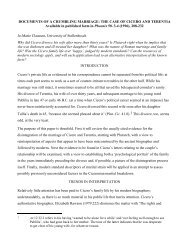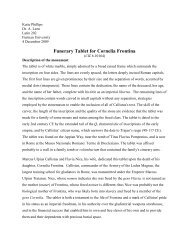C. PLINIUS MARCELLINO SUO S. (1) Tristissimus haec tibi scribo ...
C. PLINIUS MARCELLINO SUO S. (1) Tristissimus haec tibi scribo ...
C. PLINIUS MARCELLINO SUO S. (1) Tristissimus haec tibi scribo ...
Create successful ePaper yourself
Turn your PDF publications into a flip-book with our unique Google optimized e-Paper software.
Notes to Pliny, Ep. 5.16 (Sections 1–4): Worlds of Roman Women, p. 12<br />
C. Plinius Marcellino Suo S.: letter salutation: the name of the sender in the nominative, the<br />
addressee in the dative (often with suo or suae), and the abbreviation S. or S. D.: salutem<br />
(or salutem dicit). The identity of Marcellinus is in doubt. He may be Aefulanus<br />
Marcellinus, the recipient of letter 8.23, also relating to a death.<br />
C. Plinius Caecilius Secundus (minor), Epistulae 5.16<br />
1 tristis, -e sad. Fundanus, -i m. C. Minicius Fundanus, a friend of Pliny who became<br />
consul and later proconsul of Asia. He was a student of philosophy and a friend of<br />
Plutarch. filia minore defuncta: abl. of cause with tristissimus. defungor, -i, -functus/a<br />
sum finish, die. qua puella: abl. of comparison, translate “than.” Latin often begins a<br />
sentence with a relative pronoun or adjective to connect the new thought to the previous<br />
one. See below (6). festivus, -a, -um lively, jolly, jovial. non modo...sed not only...but<br />
(also/even). prope (adv.) nearly, practically.<br />
2 nondum not yet. impleo, -ere, -evi, -etum fill, complete. anilis, -e (cf. senilis)<br />
of/suitable to an old woman. matronalis, -e of or suitable to a matrona. verecundia, -<br />
ae f. modesty, bashfulness, shyness.<br />
3 ut how. cervix, -icis f. neck, shoulders (often in pl.). inhaereo, -ere, -haesi, -haesum<br />
hang on, cling to. complector, -i, complexus/a sum embrace. nutrix, -icis f. nurse,<br />
nanny. paedagogus, -i m. personal slave who accompanied a child, minder.<br />
praeceptor, -oris m. teacher. She would have had private tutors for grammar school.<br />
Some of the philosophers of this time, notably Musonius Rufus and perhaps Plutarch,<br />
favored equal education for women. pro for. diligo, -ere, -lexi, -lectum cherish, love,<br />
prize. lectito (1) frequentative of lego, read (a frequentative is a verb derived usually<br />
from the supine stem of another verb to show intensity or repetition of action), thus read<br />
often, eagerly, or assiduously. parce (adv.) sparingly. custodite (adv.) cautiously, with<br />
reserve. ludo, -ere, lusi, lusum play, frolic. qua...qua...qua: ablative; anaphora –<br />
repetition for emotional effect. illa: nominative, referring to Fundanus’ daughter, whose<br />
name is not given, but would have been Minicia after her father’s nomen, and, since she<br />
is the younger daughter, she might be called Minicia Minor. Because of the custom of<br />
naming girls from their father’s gens name (cf. Tullia, Julia, Cornelia), there is no need<br />
to mention her name, athough a second name (Marcella) is known from her epitaph (see<br />
illustration at right). Her urn and epitaph were found in the family tomb (ILS 1030): D.<br />
M. Miniciae Marcellae Fundani f(iliae). v(ixit) a(nnos) xii m(enses) xi d(ies) vii.<br />
D.M. = Dis Manibus (to the dear departed, lit. “to the divine shades”). It is common to<br />
include months and even days when a very young person dies. There is a slight<br />
discrepancy between her age (not quite thirteen) and the age Pliny ascribes to her.<br />
temperantia, -ae f. self-control, discretion. constantia, -ae f. perseverance, firmness.<br />
novissimus: superlative of novus, -a, -um new; in superlative most recent, last.<br />
valetudo, -tudinis f. health, often ill-health.<br />
4 obsequor, -i, -secutus/a sum comply, yield/submit to (+ dat.). adhortor (1, depon.)<br />
encourage. destitutam < destituo, -ere, -ui, -utum forsake, defraud. viribus < vis.<br />
corporis viribus vigore animi: N.B. the word order, thought of as forming an X (or<br />
chi), called chiasmus: corporis viribus X vigore animi .<br />
In this letter (dated to the first decade of the 2 nd century CE), Pliny the Younger writes to a<br />
friend about the tragic death of a young girl, the daughter of Fundanus. Pliny shows great<br />
affection for this modest, mature, brave girl who took such joy in living and learning. Already<br />
at 13 she displayed the virtues admired in grown women and was engaged to a fine young man<br />
(egregius iuvenis, 6). He offers a lively picture of a young woman in the contentment of her<br />
family life, studying, playing, socializing with adults, then falling ill and dying. Pliny is<br />
sensitive to a father’s sorrow, admonishing Marcellinus not to underestimate the father’s loss<br />
and grief.<br />
C. <strong>PLINIUS</strong> <strong>MARCELLINO</strong> <strong>SUO</strong> S.<br />
(1) <strong>Tristissimus</strong> <strong>haec</strong> <strong>tibi</strong> <strong>scribo</strong>, Fundani nostri filia minore defuncta.<br />
Qua puella nihil umquam festivius amabilius, nec modo longiore vita<br />
sed prope immortalitate dignius vidi. (2) Nondum annos xiiii<br />
[quattuordecim] impleverat, et iam illi anilis prudentia, matronalis<br />
gravitas erat et tamen suavitas puellaris cum virginali verecundia. (3)<br />
Ut illa patris cervicibus inhaerebat! ut nos amicos paternos et amanter<br />
et modeste complectebatur! ut nutrices, ut paedagogos, ut praeceptores<br />
pro suo quemque officio diligebat! quam studiose, quam intellegenter<br />
lectitabat! ut parce custoditeque ludebat! Qua illa temperantia, qua<br />
patientia, qua etiam constantia novissimam valetudinem tulit! (4)<br />
Medicis obsequebatur, sororem patrem adhortabatur ipsamque se<br />
destitutam corporis viribus vigore animi sustinebat.
Notes to Pliny, Ep. 5.16 (Sections 5–11): Worlds of Roman Women, p. 14<br />
5 duro (1) make hard, harden, persevere, hold out. hic refers to vigor animi (in 4). illi:<br />
dative of reference (translate for) referring to young Minicia. usque ad right up to.<br />
spatium, -i n. extent, length. infractus < infringo break, weaken. quo = ut eo:<br />
here introducing a relative clause of result.<br />
6 funus, -eris n. death. indignius more cruel (with abl. of comparison). destino (1)<br />
assign; engage, betroth. egregius, -a, -um outstanding. nuptiae, -arum f. pl.<br />
wedding. vocati [sumus]: i.e. the invitations had already been sent out. quod: Latin<br />
sentences often begin with a relative pronoun; translate “and this.” maeror, -oris<br />
m. grief, mourning.<br />
7 exprimo, -ere, -pressi, -pressum squeeze out, express. acceperim < accipio (ad + capio:<br />
note vowel reduction after a prefix in compound verbs). What use of the<br />
subjunctive does quantum introduce Notice how the word order, quantum animo<br />
vulnus, shows his grief overwhelming his spirit. ut multa luctuosa: ut with multa,<br />
how. multa luctuosa object of invenit. luctuosus, -a, -um causing sorrow,<br />
distressing. praecipio (prae + capio), -ere, -cepi, -ceptum take beforehand, figure<br />
out beforehand, direct. margaritum, -i n. pearl. vestes margarita gemmas:<br />
asyndeton, lack of conjunctions. quod: the antecedent is hoc. fuerat erogaturus:<br />
“he had been about to spend”; future active periphrastic. erogo (1) pay out,<br />
expend. tus, turis n. frankincense (an aromatic gum used in funeral rites, religious<br />
ceremonies and in medicine). unguentum, -i n. ointment. tus et unguenta et<br />
odores: an example of polysyndeton, overuse of conjunctions. The first three items<br />
were bought for a joyous event; the latter three are bought later for her burial.<br />
impendo, -ere, -pendi, -pensum pay out, disburse.<br />
8 eruditus, -a, -um educated. ut qui...dediderit: relative clause of characteristic implying<br />
cause (“since he is the kind of person who”). ab ineunte aetate from early youth.<br />
ineo, -ire, -ii/ivi, -itum enter, go/come in. aspernor (1, depon.) reject, disdain.<br />
expulsis virtutibus: ablative absolute. pietatis est totus: totus with the genitive<br />
indicates the involvement of the subject; pietas, -atis f. here refers to fatherly<br />
affection or devotion.<br />
9 ignosco, -ere, -novi, -notum forgive, make allowances for. ignosces...cogitaveris: future<br />
more vivid condition. refero, -ferre, -tuli, -latum recall, reproduce. ex<strong>scribo</strong>, -ere,<br />
-scripsi, -scriptum make a perfect copy of.<br />
10 proinde (adv.) therefore, consequently. si quas: “After si, nisi, num, and ne, 'ali-' goes<br />
on holiday” (i.e., quis, quid instead of aliquis after these particles). me me n t o :<br />
imperative of memini remember. solacium, -i n. comfort. castigatorius, -a, -um<br />
full of reproach/reproof, censorious. Since Fundanus was a Stoic, Marcellinus<br />
might have expected him to bear his grief without show of emotion. mollis, -e<br />
gentle, soft.<br />
11 ut...sic just as...so; a simile comparing grief to an open wound. crudus, -a, um bleeding,<br />
raw. medens, -entis m. doctor. reformido (1) shun, draw back from in fear.<br />
ultro (adv.) of one’s own will, voluntarily. mox (adv.) soon, later on. admotus, -a,<br />
-um approach, apply (as medicines). vale: the typical formula for closing a letter.<br />
Plinius minor, Epistulae 5.16 (continued)<br />
(5) Duravit hic illi usque ad extremum, nec aut spatio valetudinis aut<br />
metu mortis infractus est, quo plures gravioresque nobis causas<br />
relinqueret et desiderii et doloris.<br />
(6) O triste plane acerbumque funus! o morte ipsa mortis tempus<br />
indignius! iam destinata erat egregio iuveni, iam electus nuptiarum<br />
dies, iam nos vocati. Quod gaudium quo maerore mutatum est!<br />
(7) Non possum exprimere verbis quantum animo vulnus acceperim,<br />
cum audivi Fundanum ipsum--ut multa luctuosa dolor invenit--<br />
praecipientem, quod in vestes margarita gemmas fuerat erogaturus,<br />
hoc in tus et unguenta et odores impenderetur.<br />
(8) Est quidem ille eruditus et sapiens, ut qui se ab ineunte aetate<br />
altioribus studiis artibusque dediderit; sed nunc omnia, quae audiit<br />
saepe quae dixit, aspernatur expulsisque virtutibus aliis pietatis est<br />
totus.<br />
(9) Ignosces, laudabis etiam, si cogitaveris quid amiserit. Amisit enim<br />
filiam, quae non minus mores eius quam os vultumque referebat,<br />
totumque patrem mira similitudine exscripserat.<br />
(10) Proinde si quas ad eum de dolore tam iusto litteras mittes,<br />
memento adhibere solacium non quasi castigatorium et nimis forte, sed<br />
molle et humanum. Quod ut facilius admittat, multum faciet medii<br />
temporis spatium.<br />
(11) Ut enim crudum adhuc vulnus medentium manus reformidat,<br />
deinde patitur atque ultro requirit, sic recens animi dolor consolationes<br />
reicit ac refugit, mox desiderat et clementer admotis acquiescit. Vale.



